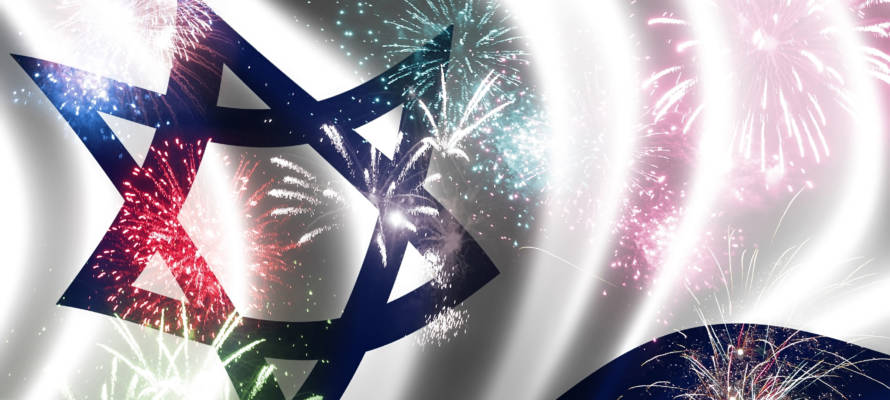Despite ongoing conflict, Israel forges ahead with its Independence Day celebrations, adapting traditions to honor heroes and maintain national spirit.
By Sveta Listratov, TPS
Holiday traditions had to be rethought and revamped because Israel never celebrated Independence Day in wartime. That meant changing, among other things, the torch-lighting ceremony marking the transition from the solemnity of Memorial Day to the joy of Independence Day.
“We will not be able to hold the torch lighting ceremony as every year. And yet, the State of Israel must mark its independence; the flag cannot remain at half-mast. We have much to be proud of,” insists Transportation Minister Miri Regev, who was tasked with overseeing the annual ceremony.
“There are usually between 12-14 torch lighters each year. This year we had to change it to 44, to be able to celebrate all those different groups and communities who showed great heroism and sacrifice in the face of the war we are still fighting,” she explained.
As a security precaution, the ceremony was filmed ahead of time, on Thursday evening, without a live audience.
During the evening, The Press Service of Israel spent time with Irene Nurith Cohn and Basma Hino, two remarkable women among the many Israelis honored for their bravery.
Recovering Bodies and Bearing Witness
“It is important to hold the ceremony this year, so that our enemies know they didn’t break our spirits. We are a strong people, we need to keep living and loving the life”, Irene Nurith Cohn says. She lights the torch of The Rescue Forces on behalf of the ZAKA organization in which she volunteers.
Amidst the chaos and devastation following Hamas’s October 7 attack, ZAKA volunteers were tasked with the solemn duty of recovering the bodies of the victims.
“Accepting the honor of lighting the torch filled me with both excitement and humility, knowing that many others from ZAKA could equally stand by my side or in my place. It’s not about me, but about what we witnessed there. It’s a tremendous and deeply moving privilege,” Cohn insists.
One week after October 7, Cohn was part of a team recovering bodies along on the Gaza border and meticulously cleaning blood-stained homes
When her mission ended months later, Cohn took it upon herself to participate in lectures recounting the events of October 7. She currently represents ZAKA on overseas missions, sharing her expereriences with anyone open to listening.
“I sense that I have never left the Gaza border since then. Returning to ordinary life feels impossible after such an experience,” Cohn explains. “I am privileged to continue the activity.”
Feeding Hungry Soldiers
“Never in my life have I imagined myself taking part in something like this. What a remarkable honor,” says Basma Hino, walking along the pathways of Mount Herzl, surrounded by people from all corners of the country and walks of life.
Amidst escalating tensions along Israel’s border with Lebanon, she transformed her restaurant in the Druze village of Julis into a vital kosher resource for soldiers stationed in the area. As a result, she is part of a group lighting the Torch of Giving.
“I want to feed all the Israeli soldiers! They all are like my children, doesn’t matter their background”, she insists. The commitment is rooted in her family’s history. Basma’s late husband, Marcel, sustained severe injuries during an army mission in 2002, leaving him hospitalized for over a decade before he passed away.
Basma persevered, harnessing her passion for baking to later establish the restaurant, “Noor.”
As the war intensified and tourism dwindled, Basma and her son Noor took action, repurposing leftover food supplies to craft meals for soldiers. Their initial effort, born out of a desire to honour Marcel’s memory, evolved into a full-fledged commitment to make the restaurant kosher, ensuring accessibility for all soldiers.
Basma dedicates one day each week to preparing meals exclusively for soldiers, with the support of volunteers who come via the Jewish National Fund-USA.
“During this period, there aren’t as many visitors to the restaurant, especially with the area heating up and recent rocket attacks on our village,” Hino notes with worry. “It’s evident that situation is escalating, which is why it’s crucial for me to keep focusing on the project of providing meals for soldiers. That’s the priority right now. Hopefully we will be able to do so as long as needed and our initiative will attract donations and volunteers.”
For Basma, the restaurant serves as more than just a place of business—it’s a symbol of solidarity and bridging divides.
“As a Druze it is very important for me to strengthen the relationship between the Druze and the Jews,” Hino insists. “We all live here together; we fight the war together and at my restaurant we cook shoulder to shoulder for our hero soldiers.”
